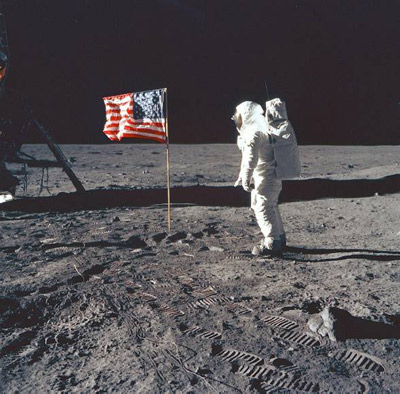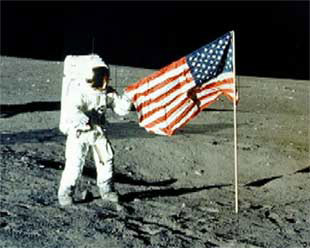July 20, 2009, - 2:37 pm
More on Historic Apollo 11 Lunar Landing: A Reader Once in the Space Program Speaks Out
By Debbie Schlussel
In my commentary, Thursday, on the 40th anniversary of the launch of Apollo 11, which resulted in the first manned landing on the moon, I said we should go to Mars, or at the very least, go to the moon again. Interviewed yesterday in a rare appearance, astronauts Neil Armstrong–the first man on the moon, Buzz Aldrin–the second, and Michael Collins (all of them in their late seventies) said much of the same:
On the eve of the 40th anniversary of the first human moon landing, the astronauts on that storied mission . . . lamented that NASA is working to send humans not to Mars but back to the moon. . . .
Collins, 78, said he had gotten to be part of the Apollo 11 crew through “10% shrewd planning, 90% blind luck.” At the same time, he said, “sometimes I think I flew to the wrong place”–a reference to his belief that Mars is more interesting than the moon.

Man on the Moon: Neil Armstrong on July 20, 1969
Aldrin, 79, also called himself “lucky” and pushed Americans to set their sights on Mars rather than the moon. “America, do you still dream great dreams? Do you still believe in yourself? Are you ready for a great national challenge?” he asked.
Sadly, I’m not sure most Americans are able to answer that question in the affirmative. In those days, Americans of all ages aimed for the Heavens. Today, they’re just interested in “The Hills.”
Today included more from Aldrin:
The astronauts who earned their fame going to the moon now can’t agree on whether the USA should go back.
At NASA headquarters earlier today in Washington, D.C., Apollo 11 moonwalker Buzz Aldrin lit into his former Apollo colleagues for supporting NASA’s plan to return humans to the moon. Aldrin could not contain himself after listening to moonwalkers Eugene Cernan and Charlie Duke urge the United States to send astronauts back to the lunar surface.
The three were attending a reunion of Apollo crewmembers on the 40th anniversary of the first steps on the moon.
“America to Mars is what ought to be, not America back to the moon,” he insisted. He scoffed at Cernan and Duke’s proposal to practice for a Mars shot by setting up a lunar base where humans would live and conduct research.
“Why go to the most difficult place, the surface of the moon, to do that?” Aldrin said. “Why not do those at the space station?”
After his attack, Aldrin laid an apologetic hand on Duke’s arm and said, “Sorry.”
At the direction of former president George W. Bush, NASA began working to send crews to the moon about 2020. Those plans are now being reconsidered by the Obama administration.
Reader Dan Galyon worked in the Space Program. He has some very interesting comments about it and why we haven’t progressed in 40 years.
Debbie:
I was privileged to have my tiny part in the space program, and personally witnessed a superlative effort, that of a collection of the finest engineers and scientists in the world. When the program was brainlessly shut down, these people were literally cast out in the street. No wonder college graduates specialize in “Drama” and other essential major areas of study, instead of engineering, math and science.
The shut down of the space program resulted in the finest team of engineers and scientists the world has ever yet seen being literally cast out of their jobs and into the streets.
In a nutshell, the NASA was a wonderful administrative creation which managed the implementation of the space program’s march to land a man on the moon, as initiated by President Kennedy. The brains of the program were “OUR” German scientists, especially Dr. Werner Von Braun. Of course the brains of the Russian missile and space programs were “Their” German scientists, who embarrassed and shocked the world with the orbit of Sputnik. Of course, they were all former employees of the Third Reich.
The guys who got the job done were the wonderful engineers and scientists, many of them ex-military people (including my father), who, having completed military careers were retiring from the service and looking for second careers.
These folks were employed by all the major aero space contractors, who bid on the many jobs required to get the project under way, and used good old American innovation and know-how to overcome the unbelievable obstacles to the program.
In the summers of 1968 and 1969, I was able to work a summer job for one of the space sub contractors, Bendix Corporation, as the son of one of their employees. This was a flunkie job, suitable for a student level trainee, and I made copies, carried mail, lugged files around, etc. But, I got to meet many of these fine people, doing millions of tasks directly and indirectly resulting in the successful launch of Apollo 11. I watched the launch from the closest unprotected positions accessible by employees, and it remains one of the great thrills of my life. You could feel the ripping concussion from the Saturn V, literally shaking the ground, and the atmosphere.
I can tell you that everywhere I went and everyone I met, the place, Cape Kennedy facilities, and the Kennedy Space Center, fairly crackled with energy, dedication, determination. It was the greatest collection of engineering talent in history.
Suddenly, after the fantastic rescue of the Apollo 13 crew, the Apollo program began to wind down, long before any public announcement surfaced. My father, concerned that the Bendix Corp. contract was closing down, retired early. I was in college, and as a typical student, failed to pay much attention to political news, but my recollection is that the Johnson administration was more concerned with creating an ever more wonderful welfare state than continuing one of the greatest endeavors in history.
Suddenly, it was OVER! I went home on summer vacation, and all the many high tech subcontractors were laying off the very engineers and scientists who had made it all possible. These people were literally working at gas stations or mowing grass, trying to keep from losing their homes, and finally, just trying to provide for their families. The prosperity and stability of Brevard County flattened like an empty paper bag. Thousands of people lost their homes, as the real estate market virtually collapsed.
There simply were not enough engineering jobs remaining to provide jobs for all the people seeking work. It was probably the greatest waste of talent in history, there is no telling what these people could have accomplished, had there been the leadership to direct them.
A couple years ago, I was sitting through the graduation of my son who, following in my footsteps, completed his BA at Florida State University. This interminable ceremony consisted mostly of degrees awarded in the field of “Drama” with relatively few engineers, mathematicians, chemists, physicists, or other “hard” scientists.
I guess if the nation can afford to cast the smart guys to the winds, there’s no reason for a student to work hard to get a degree, he or she can get a degree in Drama to help solve the big problems of history. . .
Debbie, I hope this account helps, best wishes to you, keep on telling the truth, our nation is being smothered by liars. Thanks for what you do!
Dan Galyon
And thank, Dan, for giving us an inside view, even if you were only briefly on the inside, this is yet more of the same insight as to how government bureaucracies always ruin a good thing.
Does America have the guts and the vision to overcome the bureaucratic obstacles and mindlessness that Dan Galyon described and achieve Buzz Aldrin’s vision?
Right now, sadly, I don’t think we have it in us. For a brilliant documentary on the first lunar landing and the subsequent ones, rent or buy, “In the Shadow of the Moon” (read my review).



I agree with Mr Galyon 100%. As I had a cousin who worked for Grumman and he built the lunar module and the shuttle wings. They had a can do spirit which is not found today.
The first problem was by Apollo 17 we were getting real good at staying on the moon. The last crew of Cernan and Schmidtt stayed for three days. If we just continued on we would of had bases and maybe a small city by now. Instead the powers that be which were Nixon felt the need to cut Apollo 18-20. He wanted to save money and he felt a space truck or shuttle was the way to go.
We had many trained engineers and scientists who lost their jobs just as we will when the shuttle is retired. That is why it is imperative for Obama to commit to return to the moon to stay.
He talks about education but as Dan said if you go into a science you need a job at the other end. So the current plan needs to be followed through to inspire as well as employ Americans.
What is not needed is Bill Gates clamoring for more H1B visas for foreign engineers. After all without any space program there will be plenty of unemployed or underemployed Americans. If Gates takes some of his money he could help America, the country that helped him get rich.
spaceship22 on July 20, 2009 at 5:54 pm